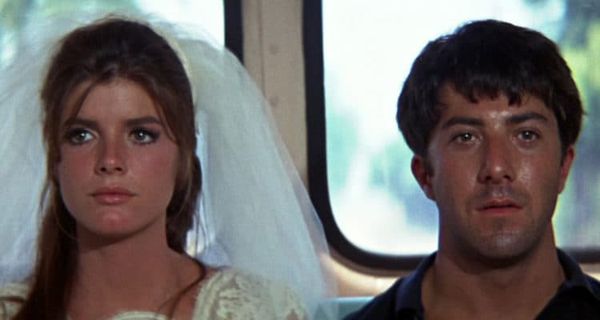Eye For Film >> Movies >> The Graduate (1967) Film Review
The Graduate
Reviewed by: Angus Wolfe Murray

Returning to this iconic Sixties movie 37 years later, certain things are immediately striking. Firstly, it feels as fresh today as it did then. Secondly, Mike Nichols is so inventive as a director. Thirdly, if you want another reason for voting it the most influential comedy of its decade, Calder Willingham and Buck Henry's screenplay remains as sharp and poised as a stiletto.
Dustin Hoffman, at that time an unknown 29-year-old off-Broadway character actor, was so obviously the wrong person to play a strapping 21-year-old blonde Californian sports jock and college graduate, who is seduced by his father's business partner's alcoholic wife. It is to his lasting credit and Nichol's belief in the symbiosis of opposites that his portrayal of Benjamin Braddock has become a benchmark performance, heralding an era of anti-heroes. Ben's evolution throughout the film from virginal wet rag to self-possessed leading man is cleverly and credibly conceived.

The philistine, pool-maintained, bar-accessorised, money-driven, lonely, phony lifestyle of these middle-class Los Angeles suburbanites is ceaselessly satirised, with memorable performances from William Daniels, as Ben's dad, and Murray Hamilton, as Mr Robinson. The humour keeps a tight grip on slapstick. In these days of 21st century grossout comic mayhem, The Graduate remains in a class of its own.
Anne Bancroft's Mrs Robinson, immortalised by Simon and Garfunkel, is a paragon of the predatory rich bored housewife, possibly too beautiful and not raddled enough, in the style of Dorothy Malone, but controlling and bitter, almost vulnerable in the harsh light of the hotel bedroom. Katherine Ross, as her daughter Elaine, has a quality of innocence that is strengthened by a clear conscience and an enquiring mind. She became the doyenne of untouchable loveliness in those years when Natalie Wood's feelings for James Dean in Rebel Without A Cause was the pinnacle of romantic yearning.
The Graduate has grown rather than diminished since 1967. The sentimentality that once offended cynical teenage critics appears charming and understated now. Above all, it can be seen as an example of precision editing (Sam O'Steen) and drop dead performances. There isn't a flabby moment or false note.
Reviewed on: 23 Oct 2004
















